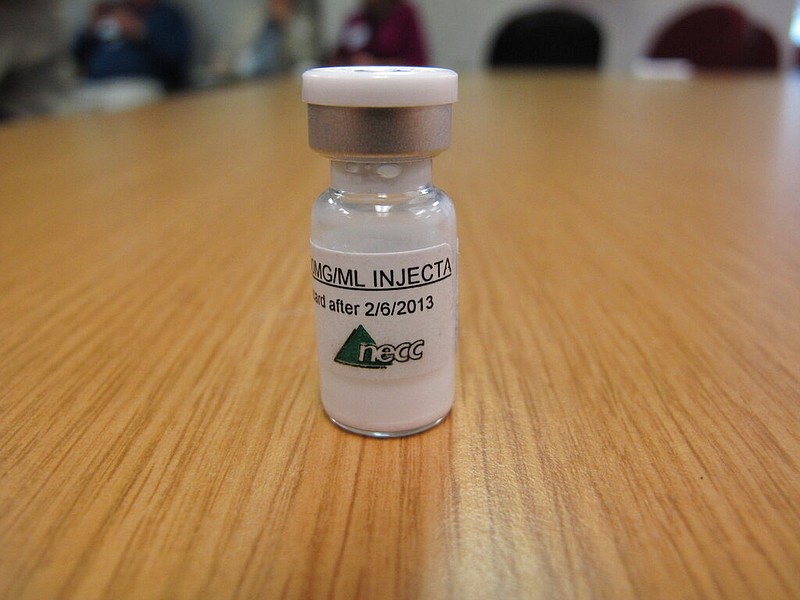A West Virginia man indicted as part of a far-flung steroid trafficking ring based out of Central Arkansas was sentenced on Wednesday to spend three years in prison for his role in the conspiracy.
Austin Randy Stone, 26, of Spurlock, W.Va., pleaded guilty last August to one count of conspiracy to distribute Schedule III controlled substances. He was one of 14 people in Arkansas, California, West Virginia and the Chinese mainland indicted by a federal grand jury in Little Rock of involvement in a conspiracy to distribute steroids that were shipped to Arkansas from both coasts, then processed, packaged and shipped out to buyers around the country.
On Wednesday, accompanied by family members from West Virginia and his attorney, Molly Sullivan with the Federal Public Defenders Office in Little Rock, Stone appeared before U.S. District Judge Brian Miller for sentencing. Under U.S. sentencing statutes, he was facing possible maximum penalties of 10 years in prison and a $500,000 fine.
Sullivan told Miller that Stone suffers from a number of health concerns related to his past steroid use, saying he first began taking steroids due to other health problems, "and he kind of took a deep dive into that lifestyle."
"It's amazing all the different health problems he has for someone so young as a result of steroid abuse," she said. "He's had a lot of digestive issues ... celiac disease, lactose intolerance ... the few weeks he was in custody were incredibly difficult for him at the county level because there was not anything available he could eat. He could eat and be sick or starve and not be sick, kind of whatever he had to do to survive."
Assistant U.S. Attorney Anne Gardner compared Stone's role in West Virginia to that of Joseph Steven Petersen of North Little Rock, who she said was the main trafficker in the Central Arkansas region. Petersen was sentenced in March to 18 months in prison for his participation.
"This was a very large conspiracy," Gardner said. "It was a multi-million dollar project. Mr. Stone supervised four people in West Virginia, went on for some period of time and he was the source for the steroids that were coming out of Charleston in West Virginia."
Gardner said that Stone's case was further complicated by two attempts to flee authorities when his activities first came to light.
"He did originally try to flee to China on a chartered plane by the main distributor in China," she said. "He did try to abscond on pre-trial supervision at one point, going to Mexico for more than a month but he did come back on his own."
Gardner said the government's position was that a sentence in the range of 36 months would be sufficient to address the offense. She said Petersen had received a reduction in his sentence for testifying at the trial of co-defendant Sarah Chezahrae Goforth last August and if not for that, she said the government would have recommended a three-year prison term for him as well. Goforth, a Los Angeles resident, was the only defendant to go to trial. She was sentenced to 21 months in prison last February.
The conspiracy came to light in mid-2019 when the DEA Little Rock office received information that Petersen was receiving and re-shipping anabolic steroids, which are classified as a Schedule III controlled substance, with a moderate to low potential for abuse and require a prescription to be legally obtained. In his plea agreement, Stone admitted to being Petersen's main contact in West Virginia and to receiving steroid products from Petersen for online distribution through his business, Misriah Supplies.
Court records indicated that Stone admitted that he arranged for Petersen to send testosterone products to a co-defendant in West Virginia -- Joshua Thrush -- who would give the products to Stone for repackaging and reshipment to customers. He was assisted by four other co-defendants -- Kayla Kraft, Jessica Davis, Nate Kuhn and Ethan Persinger -- who were tasked with repacking the packages for reshipping.
According to court records, U.S. Customs and Border Protection seized a package containing 1.5 kilograms of steroid powder at JFK Airport in New York that was destined for Thrush.
After he was arrested, court documents said, Stone admitted to running the steroid distribution website Misriah Supplies and told investigators he had previously run another site, Purple Panda Labs, for Michael Reed Jordan, a U.S. citizen living in Shenzhen, China. According to court records, Jordan and his wife, whose name is not known, are considered to be fugitives and are believed to still be living in China, beyond the reach of U.S. authorities.
All the remaining co-defendants with the exception of a California man, Allen Mitchell Gutierrez, have been sentenced in the case. Gutierrez is currently subject to a bond revocation motion filed in January but has not yet been scheduled for a hearing.
